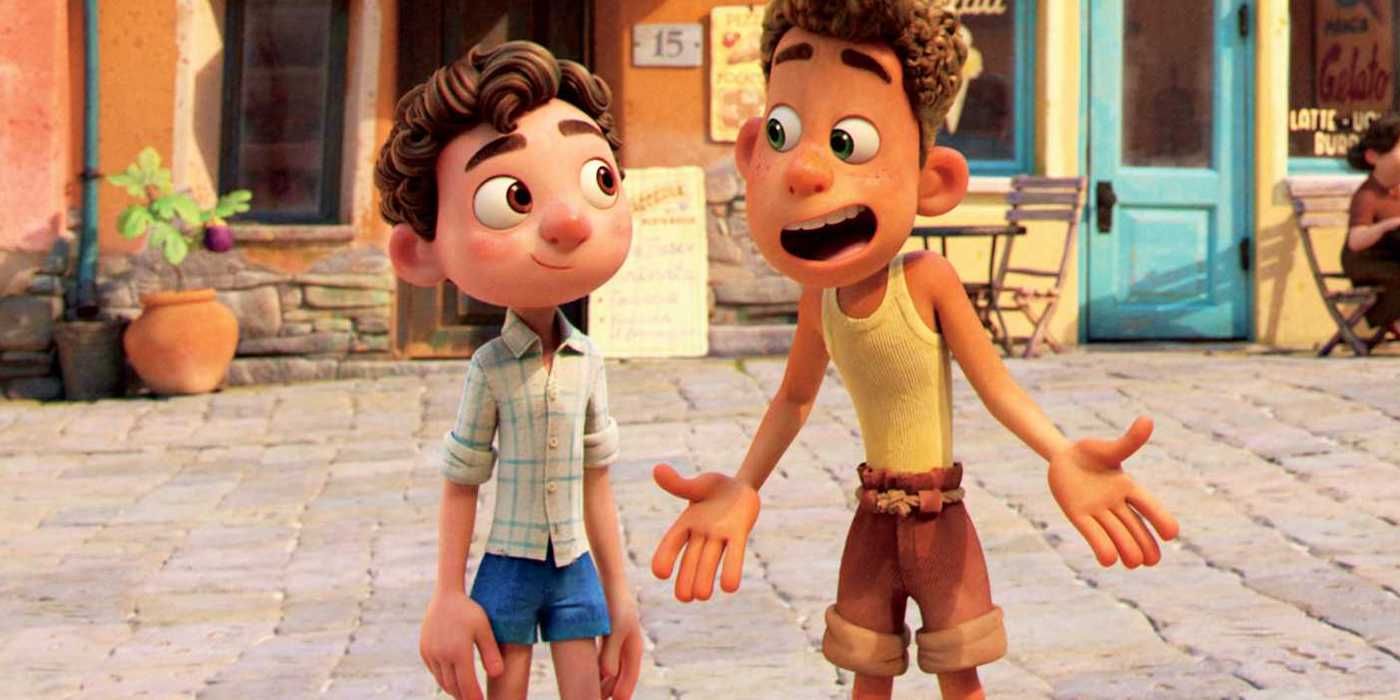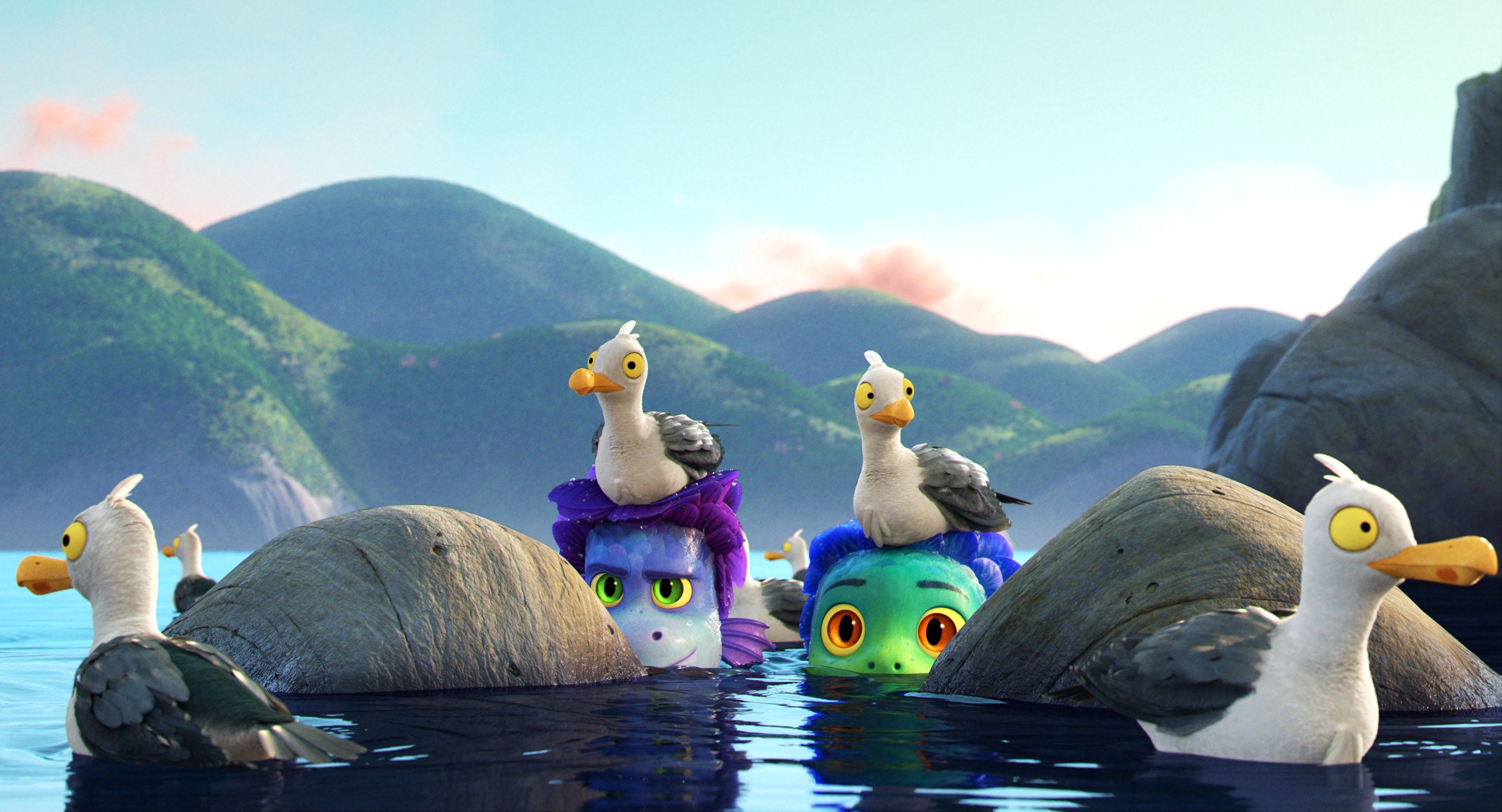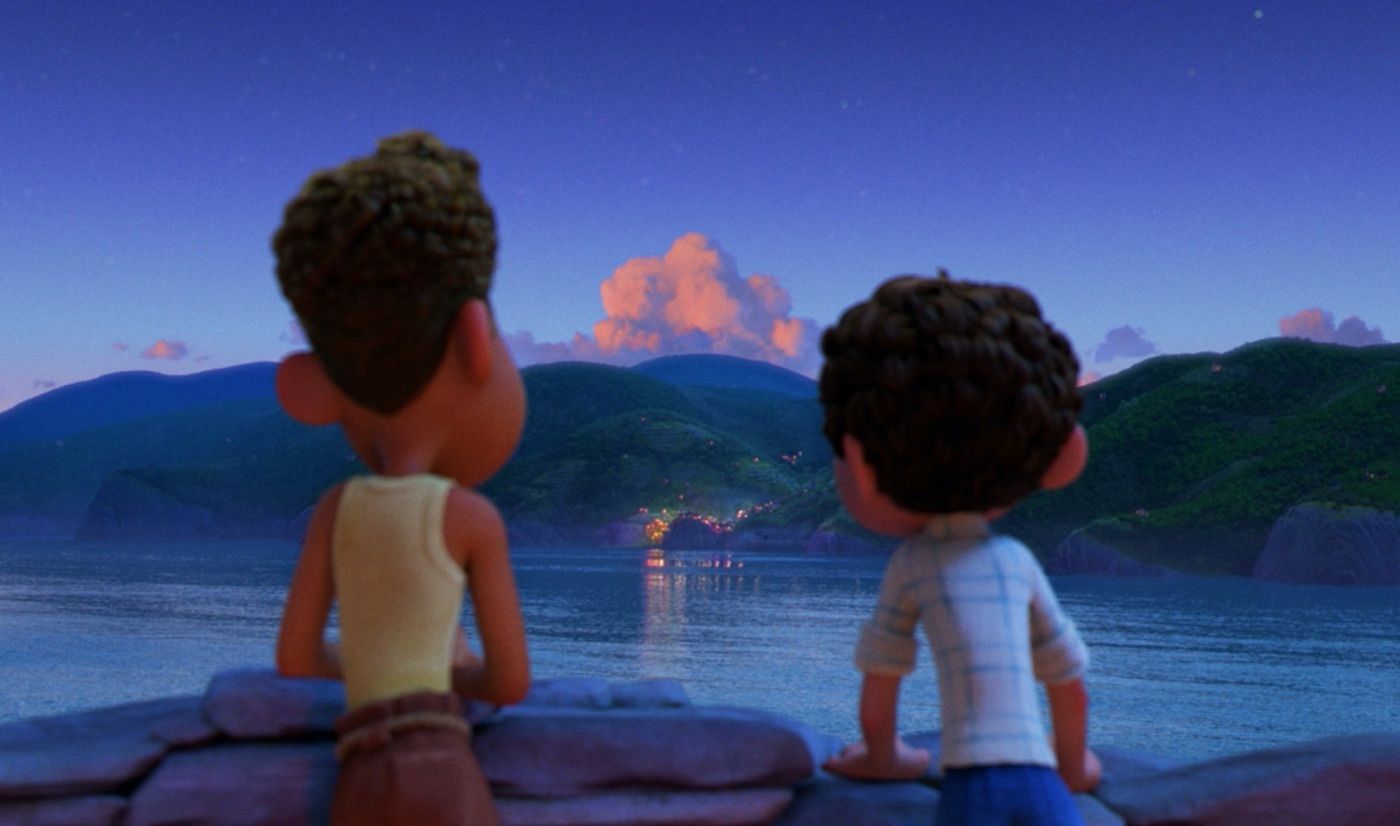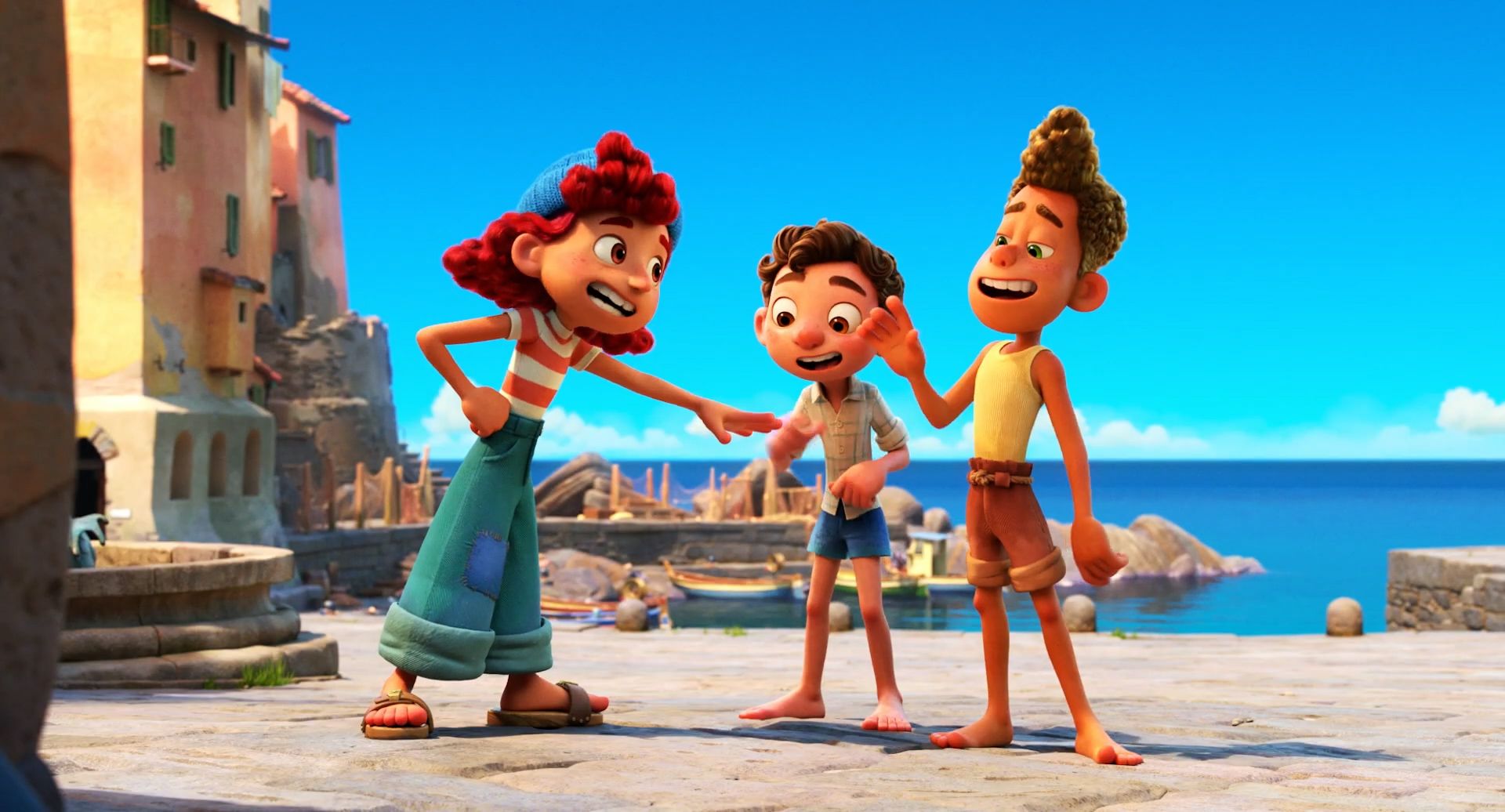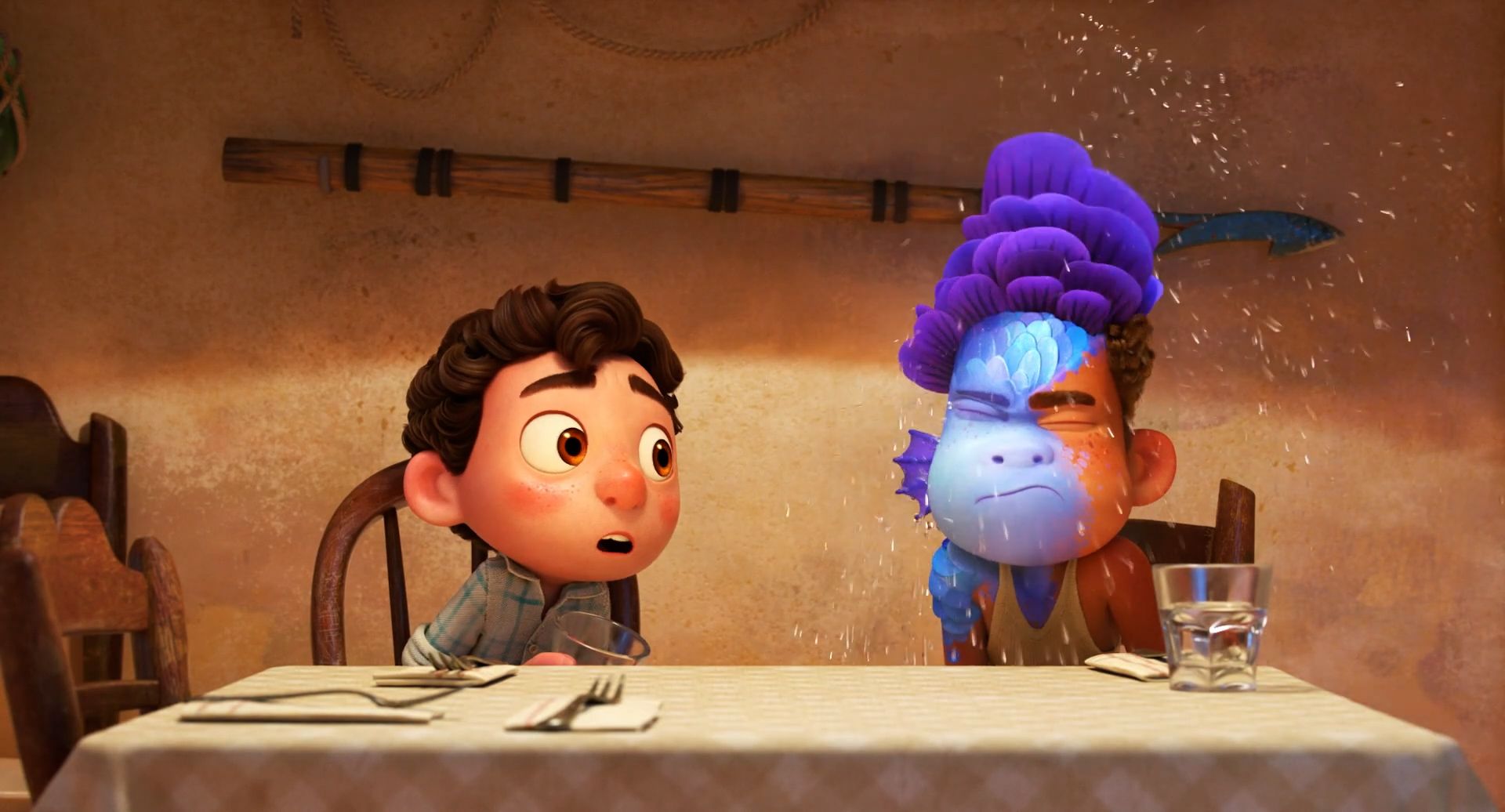Luca does not feel like your typical Pixar film, but that unique quality runs deep. Co-writer/director Enrico Casarosa’s personal story of friendship in a small sea-side Italian town is full of warmth and humanity, but is also tremendously intimate. The film has the real estate to dig deep into its lead characters because, relatively speaking, it’s being told on a much smaller scale than other Pixar films. The characters aren’t traversing a fantastical landscape or trying to find a lost friend. They’re simply trying to win a race so they can own a Vespa, because Vespas are cool. And sure, they're secretly sea monsters tying to hide their identities, but the crux of the story is the relationship between two young boys. Not a full-on battle against the townspeople.
The animation style, story structure, and scope of Luca all feel different in contrast to Pixar's ouevre, so it made sense that when it came to crafting the score, Casarosa and Co. would enlist someone who has yet to work on a Pixar movie: composer Dan Romer. It’s no surprise that Romer is a perfect fit for this earnest story about two young dreamers, as he beautifully crafted the soundscapes of films ranging from Beasts of the Southern Wild to A Ciambria to The Little Hours, and on the small screen he’s responsible for the scores for shows like Superman & Lois, The Good Doctor, and Cary Joji Fukunaga’s Netflix limited series Maniac.
As a huge fan of Romer’s work I was delighted to speak with him recently over Zoom about how he approached the score for Luca. He talked about his initial conversations with Casarosa, finding the right amount of Italian influence for the music, and how the inspiration for the film's ending came from a Weezer song. With Luca also serving as an emotional coded story for those in the LGBTQ community, I asked him if those aspects of the film were purposeful or discussed during the creative process. We also talked about his differing approaches to animation, live-action, and television, and his upcoming projects.
Check out the full interview below. Luca is now streaming exclusively on Disney+.
How did you first get involved with the film?
DAN ROMER: Well, I met with Tom MacDougall, who was the music supervisor on the film, quite awhile ago. It was right after I moved to LA, which was a little bit after I scored Beasts of the Southern Wild. He called me to his office, and we talked, and he just said, "I just wanted to let you know that I love the Beasts of the Southern Wild score, and I really want to work with you on something." He's like, "Hopefully one day something will come across the desk that is a really good fit." And then he contacted me maybe two years ago and was like, "I think I found the right fit." It was so perfect because instrumentation-wise, it's so much stuff I'm very familiar with, with accordions and folk instruments, and then the trick was just kind of... Because I've done so many Americana scores, I've done so much of Americana music, I think it was then saying, "Okay, now I have to live, breathe, and eat Italian music to sort of shift my second nature thinking to be more from an Italian point of view than an American point of view."
Luca feels so originally, and I would also say even your score feels different from a lot of other Pixar movies. What were kind of your first conversations with the director about what he was looking for in terms of the soundscape of this film?
ROMER: Well, we always knew we wanted it to have an Italian element. The question was how Italian we wanted to make it. So my first demos that I did of themes were a little bit more ambient and a little bit more weird sample driven, and then we listened to that, and Enrico said, "I think I want the whole thing to sound more Italian." The first question I had was, are the sea monsters Italian, ultimately? They live in the ocean. Are they a part of Italian culture? And the ultimate answer is, yes, the whole film has Italian culture permeating. So it was like, okay, let's figure out how to sort of make the ocean world feel different but still Italian, and how to make the world of the town feel different from that but still Italian, have Italian sound as sort of the bridge between the two worlds.
Pixar is such an institution at this point. What was your experience working with them? Did it feel different from other studios you had worked with before?
ROMER: They're incredible. They're so nurturing and they were so supportive of me as a composer, as an artist. Originally I did a much more Italian pass on a lot of the stuff. Enrico said, "This is too Italian. Let's find an in-between." And he said, "Essentially what I want is sort of an Italian version of the kind of music that you naturally make." That's kind of where we found our footing. But yeah, they're so nurturing and they're so cool to work with. They're great.
Did you get to work at Pixar, or was this a pandemic recording? Was this all remote?
ROMER: I went up one time to Pixar to watch the movie, and that was before the pandemic. And then the pandemic hit, and then it was all from my home.
Was it rough? Was it an exciting challenge, or is it still frustrating? How has that been for you as a composer?
ROMER: There's so much stuff that I miss about the world being open, and now in Los Angeles and in America, things are starting to open back up. But there was something that was helpful about just being in one building essentially for a year plus and just getting to work on music in this building. That's a chance that you don't really ever get, to just be... I guess you could arrange your life that way if you wanted to. I would miss my friends. I have missed my friends. But yeah, it definitely wasn't detrimental to the score to be just sitting in one place and kind of working on it.
I'm also curious because Pixar is pretty famous for blowing up their films and starting from scratch and redoing it. Did you come in at a stage where it was already pretty fully formed, or were there any kind of sweeping changes that you then had to adjust your work or the music you had written for the film?
ROMER: Things changed here and there, but I think the heart and soul of the story was very much there.
Were there any particular sequences or aspects of the film that were the most challenging for you to tackle?
ROMER: I guess the most challenging ultimately was the final minute and a half. We didn't really have a guide as far as what we wanted it to sound like. We weren't really sure about, not the style, but we weren't sure about really what the sounds should be like. It was a lot of experimentation, and then we landed on this thing that was like, okay, it just needs to keep growing and growing and growing and growing and growing and drove past the point where you think it would possibly grow, and then hit the resolution of it far later than you would expect it to.
I think it works tremendously because that finale is super emotional.
ROMER: Thanks so much. Yeah, my emotional reference for that sort of was the song “Only in Dreams” by Weezer. Although it has nothing in common with chords or melody or anything, that song has this build for four minutes, where it just keeps going and going. You're like, "How could this possibly get any bigger?"
Obviously, this is the story of this boy who wants to break out and wants to leave his home, but I feel there's this really strong subtext of a love story between these two boys, and a story about seeking acceptance when you’re different. It’s very coded, in a way. And I was curious, either from your personal perspective or if that was a conversation with the filmmakers for that subtext to be purposeful?
ROMER: From the beginning, Enrico said to me, "It's a story about friendship.” It's referencing stories from his childhood and stuff. I think people take what they take from things, but ultimately Enrico's goal was to make a story about childhood, about friendship in childhood.
You've worked on indies, you've worked on bigger films, you've worked in television. What were kind of the unique challenges of working in animation, or was it just kind of par for the course?
ROMER: I would say the amount of musical changes that happen are a lot more in animation, and I would say that generally, and this is so generally speaking, but live action films have less movement in the music, have less changing of pieces, and then television shows generally have a little bit more between pieces, and then animation has a little bit more than that still. It's kind of the higher end of the spectrum of how often things change. And I think a part of that is there's a heightened version of reality with animation. You very rarely will hear background voices or the sounds of streets and that kind of stuff. It's a much quieter atmosphere in terms of sound design, and I think that puts a real big focus on how much lifting the music needs to do at certain moments. The sound designers do an incredible job. The sound designers do an incredible job in this movie. I'm just saying that in general there's less talking, less kind of ambient sound than in live action.
Speaking of television, I'm just curious what that's like for you. Do you enjoy the process of scoring television? To me, it seems like just such a daunting prospect to write that much music
ROMER: I do. No, I love it. I love it. There's different reasons why I love doing all these different mediums. Generally, I choose the projects based on... I'm not like, "Oh, I really want to get into this medium or that medium." I kind of choose the projects based on what I think I'll like working on and stories that I relate to and stories that I think are cool. So, yeah, I love the TV shows that I work on, for sure. I love that process.
Is there a different process when doing something like The Good Doctor, which is a lot more episodes and keeps going, versus something like Love Life, which is really beginning, middle, and end of a story?
ROMER: Well, we are having a season two. Love Life does have themes running throughout it. It's hard to say. It's all sort of instinctual. As you're pointing out, TV shows call for different things. If you watch Ramy, that score, sometimes there'll be two pieces of music in an episode, and sometimes it'll be covered in music just depending on what the show needs. So different shows call for different things at different times. I just love the variation. When I used to work a lot more with bands, it would be really fun to do a month or two just producing a band's album, and then a film score would come up and be like, "All right, time to switch over to film score. This is exciting. Enough with this band." And then when that film was over and then I start with a new band, it's like, "Oh, this is so exciting. I get to be with all these musicians again and hang out every day." So it's just kind of fun to have a lot of variation.
That makes sense. Well, I know you can't say anything specifically about it, but this is just purely a selfish question for me, is there any chance we will ever get to hear any of your Bond score?
ROMER: I do not think so.
That really bums me out. I knew that was the answer, but I had to ask.
ROMER: But I really appreciate when people ask the question. I feel tickled by it, for sure.
Your work as a composer is really diverse, and yet there's a really distinct sound. This Pixar movie felt like something completely different than anything you had done before, but it still feels like you. Looking ahead, is there anything you're really itching to do, any types of projects that you're really excited to tackle going forward?
ROMER: I have some things I'm really excited about that are coming up, but unfortunately I can't. It's too early to talk about them.
Is there anything that you can talk about that's coming up that you're excited to kind of tease or anything you're working on currently?
ROMER Superman and Lois is still on the air. That’s happening. I love that show with all my heart. I'm a huge childhood Superman fan, and it's been so incredible to work on it. Atypical is having its last season. I also just had a collaboration with one of my oldest collaborators, Benh Zeitlin, the Beasts of the Southern Wild director, we just co-scored a film called A Chiara, which is Jonas Carpignano's new film. It's going to be playing at Directors' Fortnight at Cannes.
Oh, wow. I didn't know that somehow.
ROMER: Yeah. When I work with Benh, Benh kind of calls me, and he's like, "Hey, I have a score for us to do," and I’m like, "Get a plane from New Orleans to LA. Let's do it." And then he just comes over, and then we just hang out together. He's one of my best friends in the world, so whenever he comes to work on a movie with me, it's just amazing to be around one of my best friends. I'm always so excited to work with him. But Jonas... I don't know if you've heard of these movies, Mediterranea and A Ciambra? Benh and I scored Mediterranea together, and then A Ciambra I did alone because Benh was busy working on Wendy. Then so for A Chiara, which is the newest one, we did it together again and, man, Jonas is just on fire as a filmmaker. This film is so great. He's incredible.
Luca is now streaming on Disney+.

